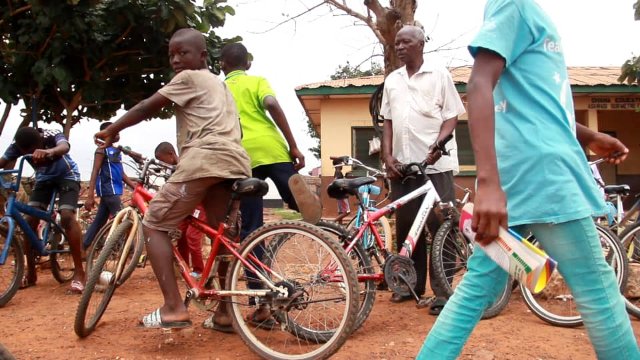Abdulai Mahama stands under a tree at the back of a public school in black khaki trouser and loose white shirt, taps his left index finger on his head and places the other hand on one of tens of bicycles here at Asawase M/A basic school in Kumasi.
With grey hair over his entire head, Mr. Mahama speaks kindly and bit by bit to school children who stand by him. It marks one of the days he has got many of the children coming into while away time in the past weeks.
“I’m just getting an actually good set up,” says Mr. Mahama, 73, who has about 50 bicycles stationed at the public school. “I plan to go as long as I possibly can.”
For many aged like Mr. Mahama, whose work was an entrenched lifestyle, retirement seems more like a prison term than a prize.
“The first year was in all probability all right,” he says. “But after that, I have to invest.”
Mr. Mahama retired from the public sector in 2007 after having served as a district revenue officer at Juaso in the Asante Akim South District of Ashanti region among other places for 38 years.
He started active service as an administrator of stool lands in 1971 in Bawku after completing his middle school there.
His 38–years of service to the country with all his might and strength paint a real picture of how he availed himself to Ghanaian.

A year after his retirement, Mahama was compelled to dedicate 1,500 cedis of his pension benefits into a bicycle renting business to complement what he receives at the end of the month.
“I didn’t have any option than to go into this old family business,” he says, adding that, it has been good seeing young children spend time with him at the public school.
He is only making sure the family tradition continues to exist but however, makes 30 cedis a day and at least, 120 cedis a month.
Mahama prefers to work to sitting idle like many of his age group who are no more in public service.
But his story is not all about economics as it may seem, he is shaping the lives of many children in the area with the bicycle renting business.

Here, children as young as ten years come to make their choice of the bicycle to while away than to joining betting or other centers.
Sule Mohammed is one of the children who come regularly to take a leisurely ride. He prefers to ride to joining others in the betting rooms.
“My grandmother has warned me not to go close to betting rooms,” Mohammed says.
Mohammed fears his grandmother will beat him up if he goes there.
On our first visit, the weather was cloudy and the winds were blowing from all directions but the children took more of the leisurely ride.
Asawase M/A basic school pitch is becoming more like a dreamland for the children and finding a father like Mr. Mahama, is an equally safe paradise.
“They call me baba (father).” Mr. Mahama says. Though he does his business to cut down expenditure, Mahama makes sure he treats them well.

The children need just 10 pesewas for a ride and that is, somehow, cheaper to them.
Mohammed and his colleagues say, they would remain committed to riding their bicycles than jumping into games that will shatter their future.
“You see, we only pay coins here. But elsewhere like game centers, you need 5 cedis upwards. We can’t afford it,” said one of the children, Mohammed Ibrahim Suraj, affectionately called Bogi by his peers.
He says he started coming here after one of his older mates performed antics marvelously on the bike.
Besides, he cannot afford to pay anything above 50 pesewas for any other game. For him, the bicycle is the best.
Mohammed and Suraj are joined by many of their colleagues. They come here either to learn how to ride or stay away from deviant behaviors.

Mr. Mahama opens his bicycle renting business every day except that he comes around 3 PM during weekdays.
Weekends are the peak of his business. School children are the major clients on Saturdays and Sundays.
Bicycles, the world over, have many uses; transport, sport or even for fun.
Farmers, traders, school children other individuals, especially, in remote areas, find the metal horse a useful tool.
But until the last decade or later, bicycles were the dominant means of transport.
Motor-cycles are, however, taking transportation by storm, roaring their way to every corner not only of towns and villages but cities, as well.




